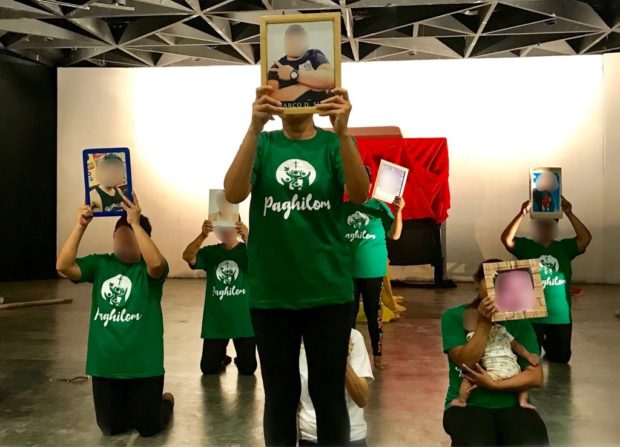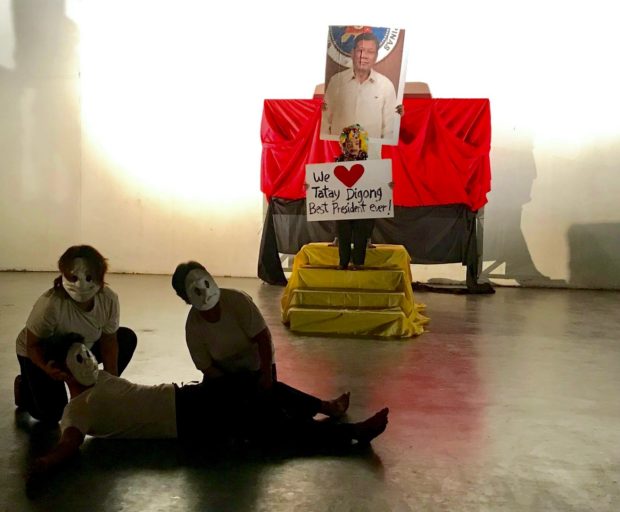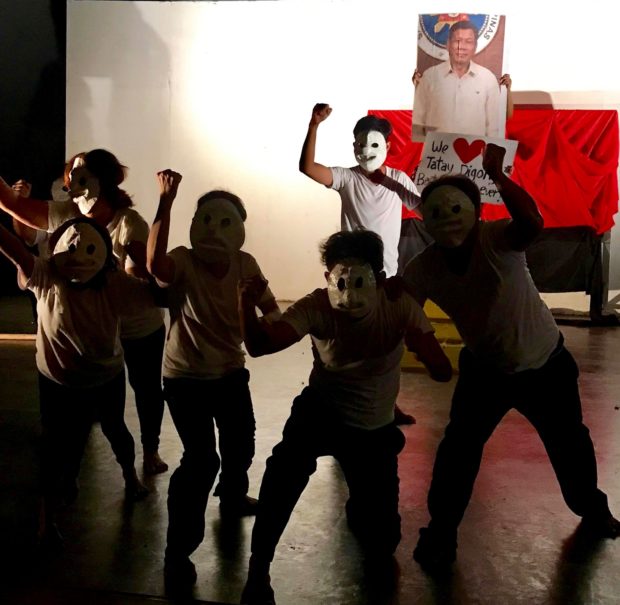Theater of the bereaved: Drug war families share hurts, strive to heal
Disturbing the comfortable was not the primary aim of the fourth batch of Paghilom – made up of the families of victims of alleged extra-judicial killings under the administration’s war on drugs – when they staged their play on April 26. Neither is it to deliver a performance that would rival those of professional theater actors, considering the fact that they only had less than three days of practice.
After all, they are not really here to perform, said activist priest Fr. Flavie Villanueva SVD, but to share their stories of woundedness. Disturbing the comfortable, it seems, was just the inadvertent effect.
“To prepare such a production would take a period of, how long? Six months? They started this only the other day, not even three days. So they’re not professionals, you would see some blocking that are not aligned, some lines that are not properly expressed or some movements that would not suit your taste,” cautioned Villanueva before the start of the play.
“But hopefully though your support, through your applause, through your understanding and most especially through your love, they won’t remain wounded,” he added.

INQUIRER.net/Cody Cepeda
Villanueva founded the Paghilom Program in 2016 to reach out to those who lost loved ones due to killings under the drug war. It offers support to the bereaved in five aspects: food and health care, psycho-spiritual intervention, legal assistance, educational assistance, and livelihood assistance. This fourth batch of families capped off their psycho-spiritual intervention, with the support of the Commission on Human Rights and Ateneo de Manila University’s Center for Family Ministries, last Feb. 23. As part of Paghilom, the fourth batch of mothers, widows and orphans who hail from Tondo and Caloocan, staged “Buhay na Winasak, Likhain: Paghilom, Misyon Natin” to share their stories of injustice to the students and faculty.
The play, which lasted almost an hour, reflected on and criticized the times. It seemed not to have spared even those of past administrations, such as the late former President Ferdinand Marcos’ regime to Corazon Aquino’s presidency, nor did it miss tackling pressing national issues such as the effects of the TRAIN law to the poor and the continued aggression of China in the West Philippine Sea, among others. Vivid and indelible, too, was when a portrait of President Rodrigo Duterte came to the fore, along with a child carrying a signage that read, “We love tatay Digong, best president ever!” A recording of one of his past speeches played in the background and was met with feigned enthusiasm from the masked actors, who clapped with their feet.
The play reaches a certain point when it stops being a play and the actors unsheathe their masks: these are replaced with framed pictures of their beloved sons, fathers and husbands. The mothers, widows and orphans, who faced their spectators for the last time, each took center stage as a recording of their own stories played from the speakers.
“Break time po ng asawa ko, dumating po ‘yung mga pulis. Tinawag ako ng asawa ko, narinig ko nalang, ‘hon yung ID ko daw,’ sabi niya,” said Lani*. (It was my husband’s break time. The police arrived. My husband called me. Then I just heard him say, “Hon, they are asking for my ID.”) She carried her baby in one arm and her husband’s portrait in the other. Her husband was allegedly gunned down by policemen outside their home in Tondo, Manila on October 2017.
“Inabot ko lang ‘yung ID, tapos sabi ho nila, ‘back up, back up! Positive positive!’” she said. “Sabi ko, ‘may CCTV dito, rereklamo ko kayo lahat!’ Tapos pinaputukan pa rin po nila, kitang kita ko po, nanginginig po ako sa takot.” (I handed them the ID, then they said, “Back up, back up! Positive, positive! I said there was a CCTV, and that I will complain about them all. Then they just fired. I saw it. I was shaking in fear.)

INQUIRER.net/Cody Cepeda
Susan*, meanwhile, lost her only son on September 2018 after he was stabbed to death in Pier Dos, North Habor in Tondo.
“Ang tama niya po ay sa ulo, sa bibig, sa braso,” she said. “Wala po akong nagawa, nakita ko lang nakalugmok na ang anak ko, puno na ng dugo, wala nang buhay.” (He got shot in the head, mouth and arm. I could not do anything. My son was down, drenched in blood, lifeless.)
“Nagmakaawa na lang po ako sa kanila (police officers, SOCO investigators) na ‘wag nalang po nilang kunin ang anak ko dahil wala po akong malaking pera na ibibigay sa kanila,” she added. “Kasalukuyan nga po sana papasok ang anak ko sa call center noong araw ng Lunes, pero Linggo pa po ng gabi, dun po nawalan ng buhay ang anak ko.” (I pleaded to them to not take away my son because I have no big money to give them. My son was supposed to report to a call center on Monday, but by Sunday he lost his life.)
Melissa*, whose husband was killed on October 2018, attempted to hide her face behind her beloved’s portrait when her turn came. He was gunned down while taking a nap in his mother’s house around 4 p.m. while his mother chopped vegetables in the kitchen. Melissa, meanwhile, was upstairs, trying to put their children to sleep.
“May bigla pong bumaba na lalaki, nakamotor, tapos po bigla po siyang naglakad sa may pintuan…habang po ‘yung nanay [ng asawa ko] nagtatadtad ng gulay, ‘yung asawa ko po nakahiga, natutulog, dahil nagpapahinga po siya, galing po siya sa trabahao,” she said. “Bigla pong binaril ‘yung asawa ko ng dalawang beses, sa dibdib, tapos po bigla na lang po sila umalis ng kasama niyang nakamotor rin.” (A man suddenly alighted from a motorcycle and walked to the door, while my mother in law was chopping vegetables. My husband was lying down, asleep, because he just came from work. My husband was all of a sudden shot twice, on the chest. The gunman hurriedly fled with a companion who was also riding a motorcycle.)
She did not know why it happened, she said, but claimed one certain police officer in the area had been wanting to arrest her husband. “Kasi meron pong isang pulis na gustong gustong kunin ‘yung asawa ko,” said Melissa. “Akala niya po kami ay drug lord o drug pusher. Eh ang asawa ko, nagtatricycle lang po yun.” (Because there was one cop who really wanted to take my husband. He thinks we are drug lords and drug pushers. But my husband was only a tricyle driver.)

INQUIRER.net/Cody Cepeda
Numbers concerning those who were allegedly murdered fluctuate depending on who is asked. The Philippine National Police (PNP) and the Philippine Drug Enforcement Agency’s (PDEA), for example, tallied the number of drug suspects killed to more than 5,000 in December 2018. Meanwhile, academe-led database Drug Archive, prepared by Ateneo de Manila University, De La Salle University and the University of the Philippines, updated the number of drug-related killings to more than 7,000 last April. Opposition groups, meanwhile, claim that the actual death toll of drug-related killings may be between 11,000 to 30,000.
But the issue may not even be about who is or is not a victim, or who is or is not directly suffering. As far as the killings are concerned, Villanueva said that every Filipino is affected. Meanwhile, despite the differences, the numbers are anything but little, considering that these are numbers involving lives.
“Kung sila’y biktima, bawat isa dito ay Pilipino, bawat isa nasusugatan sa bawat isa na pinapaslang,” said Villanueva. (If they are victims, and since each one of them are Filipinos, each one is wounded by each life that falls.) “We are them, they are us, we are Filipinos. I believe we deserve better than this, we are a man, a woman for others.”
“Madami pang nasa labas, madami pang [mga] kwento,” he said. “Ang Paghilom ay meron pa lang dalawang daan na naaabot. 30,000 pa. Katiting pa lang ito.” (There are many others outside. Paghilom has only reached 200 so far. There is 30,000 more. These are only a few.) JB
*[Editor’s note: Names of family members of the deceased have been changed to protect their identities.]
RELATED STORIES:
Academe-led database: Over 7,000 suspects killed in 3-year drug war